| Listing 1 - 10 of 15 | << page >> |
Sort by
|
Book
ISBN: 9780199939428 9780190464424 019993942X Year: 2013 Publisher: New York: Oxford university press,
Abstract | Keywords | Export | Availability | Bookmark
 Loading...
Loading...Choose an application
- Reference Manager
- EndNote
- RefWorks (Direct export to RefWorks)
"In September 2011, two leading civic engagement advocacy organizations headed, respectively, by Robert Putnam and Peter Levine released a joint report showing that a region's level of civic engagement was a strong predictor of its ability to recover from the Great Recession. This finding confirms what advocates of civic engagement have long hypothesized: that strengthening the networks between government and civil society and increasing citizen participation results in better government and better community outcomes. However, citizens concerned about the economic crisis need more than just deliberation or community organizing alone to achieve these outcomes. What they need, according to Peter Levine, is a movement devoted to civic renewal. Deliberative democracy-the idea that true democratic legitimacy derives from open, inclusive discussion and dialogue rather than simple voting-has become an extremely influential concept in the last two decades. In We Are the Ones We Have Been Waiting For, Peter Levine contends that effective deliberative democracy depends upon effective community advocacy. Deliberation, he shows, is most valuable when talk and debate are integrated into a community's everyday life. To illustrate how it works, Levine draws lessons from both community organizing and developmental psychology, and uses examples of successful efforts from communities across America as well as fledgling democracies in Africa and Eastern Europe. By engaging in this type of civic work, American citizens can meaningfully contribute to civic renewal, which, in turn, will address serious social problems that cannot be fixed in any other way"--
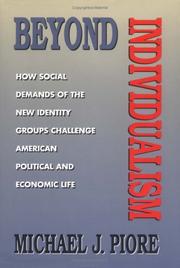
ISBN: 0674068971 9780674068971 Year: 1995 Publisher: Cambridge (Mass.) : Harvard university press,
Abstract | Keywords | Export | Availability | Bookmark
 Loading...
Loading...Choose an application
- Reference Manager
- EndNote
- RefWorks (Direct export to RefWorks)
Individualism --- Political participation --- Social movements --- Individualisme --- Participation politique --- Mouvements sociaux --- United States --- Etats-Unis --- Social policy --- Politique sociale --- Individualism - United States. --- Political participation - United States. --- Social movements - United States.
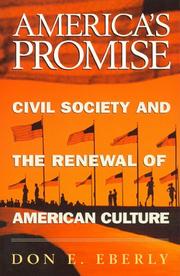
ISBN: 0847692280 0847692299 9780847692293 Year: 1999 Publisher: Lanham (Md.): Rowman & Littlefield,
Abstract | Keywords | Export | Availability | Bookmark
 Loading...
Loading...Choose an application
- Reference Manager
- EndNote
- RefWorks (Direct export to RefWorks)
Citizenship --- Civil society --- Political participation --- Values --- Nationalité --- Société civile --- Participation politique --- Valeurs (Philosophie) --- Political aspects --- Aspect politique --- Citizenship - United States --- Civil society - United States --- Political participation - United States --- Values - Political aspects - United States
Book
ISSN: 16295455 ISBN: 9782912107862 2912107865 Year: 2016 Publisher: Paris: Raisons d'agir,
Abstract | Keywords | Export | Availability | Bookmark
 Loading...
Loading...Choose an application
- Reference Manager
- EndNote
- RefWorks (Direct export to RefWorks)
Community organization --- Political participation --- Working class --- Social change --- Organisation communautaire --- Participation politique --- Travailleurs --- Changement social --- History --- Political activity --- Histoire --- Activité politique --- Manifestation --- --États-Unis --- --Militarism --- Égalité --- --Manifestation --- --Political participation --- Activité politique --- Manifestations --- Militantisme --- Participation sociale --- Militarism - United States --- Political participation - United States - History - 21st century --- Working class - Political activity - United States --- Community organization - United States - History - 21st century --- Political participation - United States - History - 20th century --- Community organization - United States - History - 20th century --- États-Unis --- Militarism
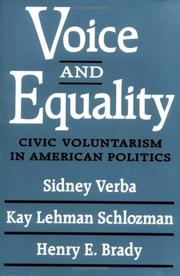
ISBN: 0674942930 0674942922 9780674942936 Year: 1995 Publisher: Cambridge (Mass.): Harvard university press,
Abstract | Keywords | Export | Availability | Bookmark
 Loading...
Loading...Choose an application
- Reference Manager
- EndNote
- RefWorks (Direct export to RefWorks)
#SBIB:324H50 --- #SBIB:328H31 --- Politieke participatie en legitimiteit (referenda, directe democratie, publieke opinie...) --- Instellingen en beleid: VSA / USA --- Political activists --- Political participation --- Voluntarism --- Community organization --- Political sociology --- United States --- Participation politique --- Activistes --- Volontarisme --- Political participation - United States. --- Political activists - United States. --- Voluntarism - United States. --- United States of America
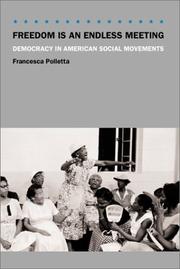
ISBN: 0226924289 1299104673 9780226924281 0226674487 9780226674483 0226674495 9780226674490 9780224674492 0226674487 9780226674483 Year: 2002 Publisher: Chicago : University of Chicago Press,
Abstract | Keywords | Export | Availability | Bookmark
 Loading...
Loading...Choose an application
- Reference Manager
- EndNote
- RefWorks (Direct export to RefWorks)
Freedom Is an Endless Meeting offers vivid portraits of American experiments in participatory democracy throughout the twentieth century. Drawing on meticulous research and more than one hundred interviews with activists, Francesca Polletta challenges the conventional wisdom that participatory democracy is worthy in purpose but unworkable in practice. Instead, she shows that social movements have often used bottom-up decision making as a powerful tool for political change. Polletta traces the history of democracy in early labor struggles and pre-World War II pacifism, in the civil rights, new left, and women's liberation movements of the sixties and seventies, and in today's faith-based organizing and anti-corporate globalization campaigns. In the process, she uncovers neglected sources of democratic inspiration-Depression-era labor educators and Mississippi voting registration workers, among them-as well as practical strategies of social protest. But Freedom Is an Endless Meeting also highlights the obstacles that arise when activists model their democracies after familiar nonpolitical relationships such as friendship, tutelage, and religious fellowship. Doing so has brought into their deliberations the trust, respect, and caring typical of those relationships. But it has also fostered values that run counter to democracy, such as exclusivity and an aversion to rules, and these have been the fault lines around which participatory democracies have often splintered. Indeed, Polletta attributes the fragility of the form less to its basic inefficiency or inequity than to the gaps between activists' democratic commitments and the cultural models on which they have depended to enact those commitments. The challenge, she concludes, is to forge new kinds of democratic relationships, ones that balance trust with accountability, respect with openness to disagreement, and caring with inclusiveness. For anyone concerned about the prospects for democracy in America, Freedom Is an Endless Meeting will offer abundant historical, theoretical, and practical insights. "This is an excellent study of activist politics in the United States over the past century. . . . Assiduously researched, impressively informed by a great number of thoughtful interviews with key members of American social movements, and deeply engaged with its subject matter, the book is likely to become a key text in the study of grass-roots democracy in America."-Kate Fullbrook, Times Literary Supplement "Polletta's portrayal challenges the common assumption that morality and strategy are incompatible, that those who aim at winning must compromise principle while those who insist on morality are destined to be ineffective. . . . Rather than dwell on trying to explain the decline of 60s movements, Polletta shows how participatory democracy has become the guiding framework for many of today's activists."-Richard Flacks, Los Angeles Times Book Review "In Freedom Is an Endless Meeting, Francesca Polletta has produced a remarkable work of historical sociology. . . . She provides the fullest theoretical work of historical sociology. . . . She provides the fullest theoretical picture of participatory democracy, rich with nuance, ambiguity, and irony, that this reviewer has yet seen. . . . This wise book should be studied closely by both academics and by social change activists."-Stewart Burns, Journal of American History
Social movements --- Community organization --- Political participation --- Group decision making --- Collective decision making --- Decision-making, Group --- Decision making --- Social movements - United States --- Community organization - United States --- Political participation - United States --- Group decision-making - United States --- Mouvements sociaux --- Organisation communautaire --- Participation politique --- Décision de groupe --- Group decision-making
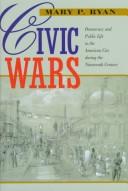
ISBN: 0520204417 0520216601 Year: 1997 Publisher: Berkeley ; Los Angeles ; London University of California Press
Abstract | Keywords | Export | Availability | Bookmark
 Loading...
Loading...Choose an application
- Reference Manager
- EndNote
- RefWorks (Direct export to RefWorks)
Political participation --- Political culture --- Democracy --- City and town life --- Participation politique --- Culture politique --- Démocratie --- Vie urbaine --- History --- Histoire --- United States --- New York (N.Y.) --- New Orleans (La.) --- San Francisco (Calif.) --- Etats-Unis --- La Nouvelle-Orléans (Louis.) --- Politics and government --- Politics and government. --- Politique et gouvernement --- Démocratie --- La Nouvelle-Orléans (Louis.) --- 19th century --- To 1898 --- New Orleans, La. --- Political participation - United States - History - 19th century. --- Democracy - United States - History - 19th century. --- City and town life - United States - History - 19th century.
Book
ISBN: 9780199394609 9780199394593 9780199394616 019939461X 0199394598 0199394601 0199394628 Year: 2014 Publisher: Cary : Oxford University Press,
Abstract | Keywords | Export | Availability | Bookmark
 Loading...
Loading...Choose an application
- Reference Manager
- EndNote
- RefWorks (Direct export to RefWorks)
"Much has been written about the historic nature of the Obama campaign. The multi-year, multi-billion dollar operation elected the nation's first black president, raised and spent more money than any other election effort in history, and built the most sophisticated voter targeting technology ever before used on a national campaign. But what is missing from these accounts is an understanding of how Obama for America organized its formidable army of 2.2 million volunteers -- over eight times the number of people who volunteered for democratic candidates in 2004. Unlike previous field campaigns that drew their power from staff, consultants, and paid canvassers, the Obama campaign's capacity came from unpaid local citizens who took responsibility for organizing their own neighborhoods months--and even years--in advance of election day. In so doing, Groundbreakers argues, the campaign enlisted citizens in the often unglamorous but necessary work of practicing democracy. Hahrie Han and Elizabeth McKenna argue that the legacy of Obama for America is a transformation of the traditional models of field campaigning. Groundbreakers makes the case that the Obama ground game was revolutionary in two regards not captured in previous accounts. First, the campaign piloted and scaled an alternative model of field campaigning that built the power of a community at the same time that it organized it. Second, the Obama campaign changed the individuals who were a part of it, turning them into leaders. Groundbreakers proves that presidential campaigns are still about more than clicks, big data and money, and that one of the most important ways that a campaign develops its capacity is by investing in its human resources"--
POLITICAL SCIENCE / Political Process / Elections. --- POLITICAL SCIENCE / Government / National. --- Presidents --- Political campaigns --- Political participation --- Présidents --- Campagnes électorales --- Participation politique --- Election --- Obama, Barack. --- United States --- Etats-Unis --- Politics and government. --- Politique et gouvernement --- Présidents --- Campagnes électorales --- 2008 --- 2012 --- Obama, Barack --- Politics and government --- Obama, Barack, 1961 --- -Political participation --- Political campaigns -- United States. --- Political participation -- United States. --- Presidents -- United States -- Election -- 2008. --- Presidents -- United States -- Election -- 2012. --- United States -- Politics and government. --- -Obama, Barack.
Book
ISBN: 9783531912189 3531161415 9783531161419 3531912186 Year: 2008 Publisher: Wiesbaden : VS, Verlag fur Sozialwissenschaften,
Abstract | Keywords | Export | Availability | Bookmark
 Loading...
Loading...Choose an application
- Reference Manager
- EndNote
- RefWorks (Direct export to RefWorks)
For the last twenty years gender equality has been on the agenda of national higher education policies both within Europe and beyond it. Previous research in this area has produced numerous case studies about programmes at institutions of higher education as well as reports about national policies. Building on this material, the authors of this book analyse under which circumstances equality programmes are successful. In order to develop a deeper understanding of the mechanisms of and barriers to gender equality in higher education this book presents comparative studies and research focusing on the development of gender equality policies in different countries, as well as studies on the conditions for implementing policies, changes in strategies and the evaluation of gender equality programmes.
Social Sciences. --- Sociology, general. --- Gender Studies. --- Social sciences. --- Developmental psychology. --- Sciences sociales --- Psychologie du développement --- Political participation -- United States. --- Sex discrimination in higher education --- Women in higher education --- Women in science --- Social Change --- Education, Special Topics --- Education --- Sociology & Social History --- Social Sciences --- Sociology. --- Sex (Psychology). --- Gender expression. --- Gender identity. --- Sex identity (Gender identity) --- Sexual identity (Gender identity) --- Identity (Psychology) --- Sex (Psychology) --- Queer theory --- Expression, Gender --- Sex role --- Psychology, Sexual --- Sex --- Sexual behavior, Psychology of --- Sexual psychology --- Sensuality --- Social theory --- Social sciences --- Behavioral sciences --- Human sciences --- Sciences, Social --- Social science --- Social studies --- Civilization --- Psychological aspects --- Education, Higher

ISBN: 0803928734 0803928726 9780803928725 9780803928732 Year: 1987 Volume: v. 165 Publisher: Beverly Hills: Sage,
Abstract | Keywords | Export | Availability | Bookmark
 Loading...
Loading...Choose an application
- Reference Manager
- EndNote
- RefWorks (Direct export to RefWorks)
Political participation --- Communication in politics --- Democracy --- Technology --- Participation politique --- Communication politique --- Démocratie --- Technologie --- Social aspects --- Aspect social --- Democracy. --- -Democracy --- -Technology --- -Applied science --- Arts, Useful --- Science, Applied --- Useful arts --- Science --- Industrial arts --- Material culture --- Citizen participation --- Community action --- Community involvement --- Community participation --- Involvement, Community --- Mass political behavior --- Participation, Citizen --- Participation, Community --- Participation, Political --- Political activity --- Political behavior --- Political rights --- Social participation --- Political activists --- Politics, Practical --- Self-government --- Political science --- Equality --- Representative government and representation --- Republics --- Political communication --- -Communication in politics --- -Social aspects --- -Political participation --- Démocratie --- Political participation - United States. --- Communication in politics - United States. --- Technology - Social aspects - United States.
| Listing 1 - 10 of 15 | << page >> |
Sort by
|

 Search
Search Feedback
Feedback About UniCat
About UniCat  Help
Help News
News